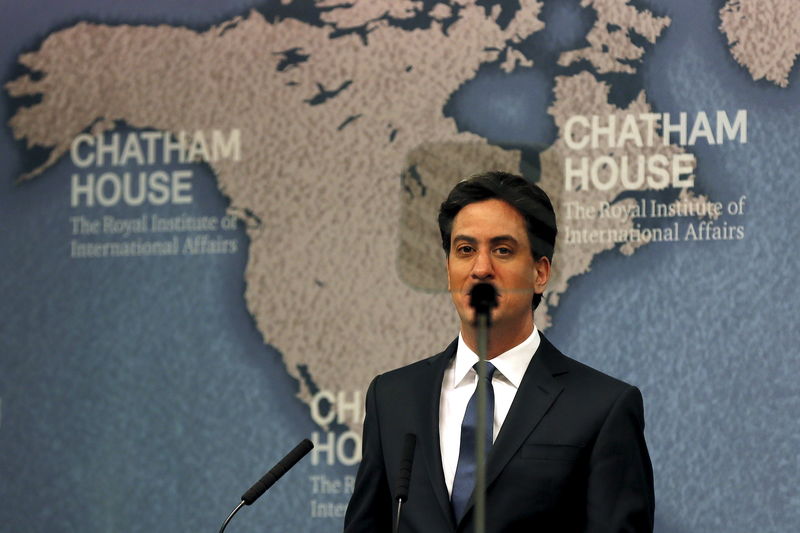By Andrew Osborn
LONDON (Reuters) - Britain's Labour Party on Sunday ruled out a post-election deal with Scottish nationalists after Prime Minister David Cameron's Conservatives said such a tie-up could spark the biggest constitutional crisis since the 1936 abdication of the king.
The policy shift, by Labour leader Ed Miliband, was designed to blunt what has become Cameron's main attack line before the May 7 election, a contest that is shaping up to be the country's closest and most unpredictable since the 1970s.
The stakes are unusually high: Cameron is promising a European Union membership referendum which could see the world's fifth largest economy leave the trading bloc, while Scottish nationalists are pushing for a deal with Labour which opponents fear could pave the way for another independence referendum.
With Labour and the Conservatives level in most polls and neither on track to win an outright majority, Cameron has gone from talking up his economic achievements to warning that a tie-up between Labour and the pro-independence Scottish National Party (SNP) could lead to a UK break-up.
Miliband had previously ruled out a formal coalition with the SNP, but had left the door open to a looser arrangement. On Sunday, he went further, ruling out an informal deal known as a 'confidence and supply' arrangement.
When asked if he would negotiate with the SNP after the election if he failed to win a majority, Miliband told the BBC's Andrew Marr Show: "I'm not interested in deals no."
"I want to be clear about this. No coalition, no tie-ins. I'm not doing deals with the Scottish National Party."
The shift - which rules out Labour ruling as a minority government relying on the SNP in parliament on an issue-by-issue basis - narrows Miliband's room for maneuver and reflects his concern that the Conservative message is "cutting through," in particular to English voters worried about Scottish influence.
It suggests that Labour would adopt a different strategy if it fell short of a majority: Try to rule as a minority government and challenge the SNP, which is also left-wing, to vote it down, something that would benefit the Conservatives.
The calculation would be that the SNP would not do so because it would struggle to explain to its own supporters why it had brought down a left-wing government to make way for a right-wing one.
CONSTITUTIONAL CRISIS?
The Conservatives, who have struggled to turn an economic upturn into extra voter support, have stepped up their warnings about what they say would be the risks of a Labour-SNP deal.
Theresa May, Cameron's interior minister, on Sunday said such a pact could trigger Britain's biggest constitutional crisis since the 1936 abdication of King Edward VIII, an episode that roiled the ruling class.
"Miliband would be in government on the coat-tails of (SNP leader) Nicola Sturgeon. They would be calling the tune – people who don't want the UK to exist and want to destroy our country," May told the Mail on Sunday newspaper.
"There would be a very real feeling was this was something people did not want to see, had not voted for and would find very difficult to accept. It would raise difficult questions about legitimacy. A lot of English people would question that."
Cameron said on Sunday that such a tie-up would spell higher taxes, more borrowing, more expensive mortgages and fewer jobs.
"This is the choice we're laying out," Cameron wrote in the Sunday Telegraph. "Ed Miliband locked in a death dance with the SNP, taking our economic recovery down with them; or the Conservatives back in government, with a clear plan."
Scots voted to preserve the United Kingdom in a Sept. 18 referendum last year. But opinion polls indicate the once marginal pro-independence SNP is on course to take the lion's share of Labour's Scottish seats.
If the polls are accurate, the rise of the SNP could dash Miliband's dreams of winning the election and thrust secessionist 'kingmakers' to the heart of British power.
If Miliband did try to rule with a minority government that had neither a formal coalition deal nor an informal support deal in the Westminster Parliament, its future could be much more uncertain than any British government since the 1970s.
'HORRIFYING PROSPECT'
Cameron, whose political future is on the line, has a problem: The more he talks about the SNP, the less he speaks about the economy, something he will try to return to center-stage this week.
As the vote draws nearer and the polls remain tied, Conservative donors are getting nervous amid unconfirmed talk that successors to Cameron are being lined up if he loses.
London mayor Boris Johnson would be one frontrunner. He dismissed such talk as "nonsense" on Sunday.
Peter Hall, a multimillionaire investment manager and major Conservative donor, told The Sunday Times newspaper he was worried about Cameron's "curious lack of energy and belief in his campaign."
He called on the prime minister to raise his game and "unleash visceral passion and belief in his vision of the future" to win on May 7.
"Some people are really quite resigned to losing and they are planning the next step. It's a horrifying prospect if we were to lose. How can we lose when so much is at stake and when we have such a strong hand?"
